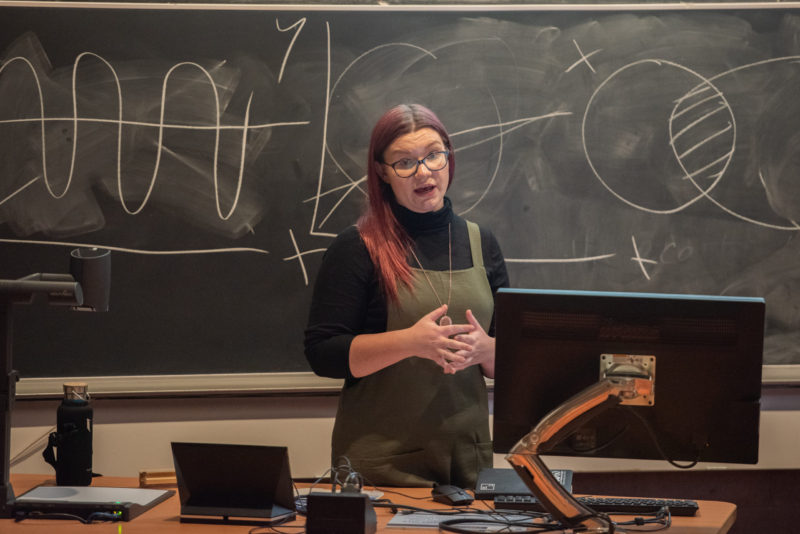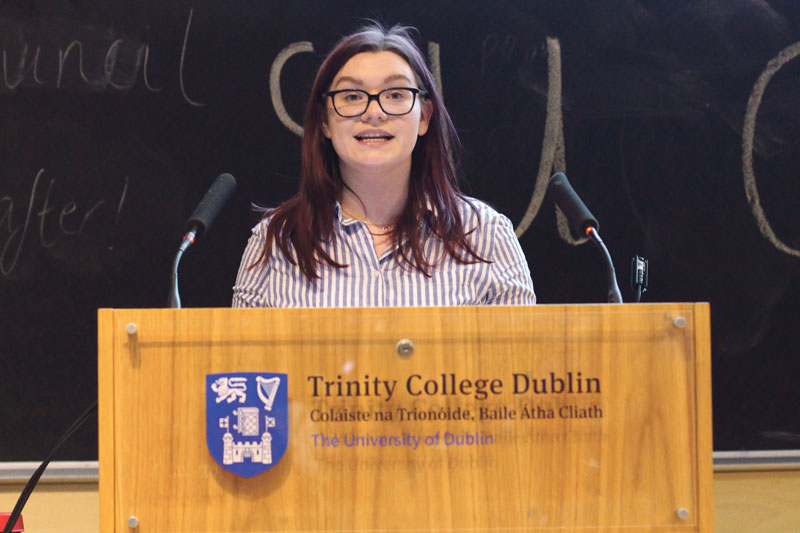Lorna Fitzpatrick, the president of the Union of Students in Ireland (USI), has had a tumultuous year. Her vice-president Michelle Byrne was forced to step down in embarrassing circumstances for the organisation, and its flagship march late last year was called off thanks to Hurricane Lorenzo.
Then the coronavirus hit the country, leaving higher education in an extremely precarious position. Looming large over all of that is the never-ending higher education funding crisis and the never-ending dearth of affordable accommodation.
Fitzpatrick could be forgiven, then, for deciding that a year was enough. But she has thrown her hat in the ring for a second time, and – as she runs unopposed – is almost certain to win a second term as president.
As the government throws vast amounts of borrowed money at the pandemic and faces the biggest recession in a century, it would seem likely that higher education will remain low on its list of priorities.
But in an interview with The University Times, Fitzpatrick argues that as unemployment figures creep up, higher education will be discussed even more than now: “I actually think [higher education] is going to come up on the agenda even more so now in the wake of COVID-19, because we have seen the unemployment figures and we know that our society is going to deal with a new normal and so it’s not going to a return to the way things happened pre-COVID.”
I actually think higher education is going to come up on the agenda even more so now in the wake of COVID-19
“I think the reality is that the funding gap that has been left by the private funding providers places the emphasis on the fact that we need to increase that funding through the public sources.”
However, for the moment, funding is not at the top of Fitzpatrick’s list of priorities. That place is reserved for perhaps the most contentious issue in Ireland for the past few years: accommodation.
“It links in so much with access”, she says. “I think first we need to try to get clarity around what the new academic year is going to look like, as to whether people need accommodation or if it’s going to be mostly online.”
Fitzpatrick’s approach to the problem seems hands-on: she says she wants to help student representatives on the ground nudge colleges into making decisions about what pedagogical route they plan to go down. Surprisingly, her advice to students currently looking for accommodation is to take a “breather” on looking for accommodation: “It really would be about taking that pause for the moment until we know exactly what the situation is going to be.”

Fitzpatrick ran a stable ship this year – but next year will bring unprecedented challenges for USI.
“The last thing we want is students who have paid thousands in deposits for accommodation that they won’t need or may not need depending on what the situation may be”, she adds.
On the more nitty-gritty aspects of accommodation, Fitzpatrick comes armed with a new student accommodation position paper that she will bring to Congress next week. She hopes to lobby the government to extend the current coronavirus-induced rent freeze and ban on evictions.
The main points in the paper, she tells me, will address the lack of legislative protections for students living in accommodation such as digs or purpose-built student accommodation, as well as a rental-deposit protections scheme to make sure that tenants don’t take off with pricey deposits, leaving students in the lurch. Instead a third party – the Residential Tenancies Board is one possibility she suggests – will keep the deposit until the tenancy is over.
However, outside the halls of the Dáil, it is unclear how USI will put the pressure on politicians to make the changes that the organisation is looking for. Fitzpatrick says that all actions they take will be “caveated with public health advice warnings”, but adds that USI has already engaged with external organisations to look at alternative – probably online – actions.
Fitzpatrick is keen to caveat that the responsibility for many of these plans lies at the door of the campaign strategy committee and USI’s vice-president for campaigns, but, when pushed, her suggestions for potential actions seem fairly nebulous: it is unlikely tweets, photo calls and email drops will be able to replace large-scale marches or on-campus demonstrations.
We’re going to be faced with social distancing for many months to come, so the potential of holding a large-scale mass demonstration in that way is probably limited
Most notably, Fitzpatrick says: “The president-elect would always meet with the campaign strategy committee to set the agenda for what that looks like. Now last year I would have gone into that meeting proposing a march alongside a number of other things, and that had been agreed, but it is the committee that will agree on what the action will be.”
“But the reality is that we’re going to be faced with social distancing for many months to come, I imagine, so the potential of holding a large-scale mass demonstration in that way is probably limited”, she adds. The normal demonstration may be transformed into a social-distance-friendly demonstration of some kind, but again nothing seems concrete.
While higher education institutes wade through the funding mire that is the coronavirus, students – who are most powerful when they can get thousands of feet on the ground – will be unable to recreate the marches that have become a staple of college life in recent years. Fitzpatrick is right when she says that they will have to think “outside of the box” – but that’s easier said than done. Making students’ voices heard without the usual avenues open to her will probably be one of Ftizpatrick’s biggest challenges next year as president.
Away from the horrors of coronavirus, higher education and accommodation, Fitzpatrick is working to consolidate USI’s path for the next five years with the strategic plan that she is bringing to this year’s Congress – fulfilling her campaign promise last year to lead “the change within our movement”.
The plan has been built up slowly over the past year, and is redolent of existing USI policies – better access to higher education, students’ union autonomy, improving the quality of third-level learning – with a few additions. Its main goal is to chisel out stepping stones so that regardless of who is in charge, the union has a direction. It also introduces new plans such as the incoming democratic and constitutional review, as well as measures that have sprung up this year but haven’t been followed through on yet. As president, Fitzpatrick has been a coherent and stable figure – the strategic plan may implant some of this solidity into the union.
One area where coherence is needed is students’ union autonomy – another persistent problem for students. Meddling college administrations tired of angry students can often put the pressure on students’ unions to back down, as was seen in 2016 in Dublin Institute of Technology when the college’s administration tried to cut the union’s funding in retaliation for its disobedience.
As president, Fitzpatrick has been a coherent and stable figure – the strategic plan may implant some of this solidity into the union
Since then, autonomy has been a hot topic, and Fitzpatrick’s fix is not a quick one: “We’re looking at developing a legislative kind of basis for students’ union autonomy, but it does take time to develop this, because as I said there are some students’ unions who need additional support in terms of building up further accountability structures and so on.”
All in all, Fitzpatrick has built a strong platform to work from this year, but the difficulties she faces now are mountainous – and many are probably indiscernible for the moment. As coronavirus shoves issues offstage and soaks up the limelight, important issues such as direct provision and Brexit take a backseat. Brexit in particular may unveil some nasty surprises next year.
Fitzpatrick has pledged to fight for legislative protections for the University of Sanctuary scheme, which has helped asylum seekers but hasn’t been able to prevent deportation orders for students around the country.
On Brexit, she wants to work with USI’s partner organisations in Great Britain and Northern Ireland while lobbying European and Irish politicians for protections for students. How she will find time during the pandemic is another question.
Fitzpatrick’s policy platform is comprehensive and she is a much-needed steady hand who has demonstrated the ability to steer USI through choppy waters. When asked about Byrne’s resignation – which happened a day before the lockdown – Fitzpatrick paints a picture of her team coming together and “ensuring that the issues that are facing students are still very much at the forefront of all of our agendas”. But in reality, Byrne’s resignation – over comments she made in a secret recording published by far-right website the Burkean – put USI in an extremely uncomfortable position.
A few months on, however, it seems Fitzpatrick has minimised the damage and kept the organisation on track – a skill she will surely need to draw on throughout next year. But making sure that USI and the student movement emerge from the coronavirus pandemic stronger than they entered it will require more than strong leadership and a calm head. It calls for an ambition that Fitzpatrick has not yet needed to demonstrate. Next year will not be an easy one for USI.







